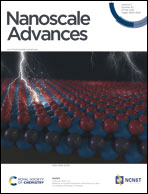
Nanoscale Advances
metrics 2024
Innovating at the Nanoscale for Tomorrow's Solutions.
Introduction
Nanoscale Advances, published by the Royal Society of Chemistry, stands out as a leading open-access journal dedicated to advancing the field of nanoscience and nanotechnology since its inception in 2018. With a specialized focus on areas such as atomic and molecular physics, bioengineering, chemistry, and materials science, this journal has consistently achieved top-tier rankings across several categories, reflecting its high-impact contribution to research and innovation. Currently classified in the Q1 quartile for both Atomic and Molecular Physics and Chemistry (Miscellaneous), and Q2 for Bioengineering, its prestige is underscored by impressive Scopus rankings, including a notable 34th position in General Engineering. With its commitment to disseminating high-quality research, Nanoscale Advances serves as an invaluable resource for researchers, professionals, and students alike, fostering collaboration and scholarly exchange in the rapidly evolving landscape of nanotechnology.
Metrics 2024
 0.95
0.95 4.60
4.60 4.80
4.80 59
59Metrics History
Rank 2024
Scopus
IF (Web Of Science)
JCI (Web Of Science)
Quartile History
Similar Journals

Nanobiotechnology Reports
Pioneering research for a nano-enabled tomorrow.Nanobiotechnology Reports, an impactful journal published by PLEIADES PUBLISHING INC, serves as a prominent platform for disseminating cutting-edge research at the intersection of nanotechnology and biotechnology. With its ISSN 2635-1676 and E-ISSN 2635-1684, this open-access journal is committed to providing researchers, professionals, and students with accessible knowledge and innovations that drive advancements in this rapidly evolving field. Operating out of the United States, Nanobiotechnology Reports has established itself in various engineering and science categories, including Bioengineering and Biomedical Engineering, currently holding a Q4 quartile ranking in 2023. Although it is in the early stages of its publication journey since its convergence in 2021, the journal aims to foster collaboration and knowledge-sharing within the scientific community, addressing the complexities of nanomaterials and their applications in biological systems. Researchers and practitioners in nanobiotechnology are encouraged to contribute to this expanding body of knowledge, facilitating the development of innovative solutions that impact various sectors, from healthcare to electronics.
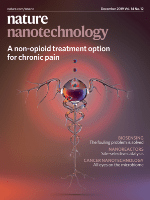
Nature Nanotechnology
Pioneering Innovations at the Nanoscale.Nature Nanotechnology, published by NATURE PORTFOLIO, stands at the forefront of scientific innovation, focusing on the rapidly evolving field of nanoscience and nanotechnology. With an impressive impact factor and ranking in the top Q1 quartiles across multiple disciplines—including Atomic and Molecular Physics, Bioengineering, and Materials Science—this journal is a pivotal resource for researchers and professionals dedicated to advancing knowledge and applications at the nanoscale. Its diverse scope encompasses cutting-edge research that bridges disciplines, addressing critical challenges in engineering, physics, and biomedical fields. Although the journal currently does not offer an open-access option, readers can access a wealth of information that is vital for anyone involved in pioneering research and development efforts. With its robust editorial standards and a commitment to publishing high-caliber, groundbreaking work, Nature Nanotechnology serves as an indispensable platform for the dissemination of transformative ideas that will shape the future of technology and science.
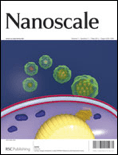
Nanoscale
Connecting Global Minds in Nanoscience.Nanoscale is a premier academic journal published by the Royal Society of Chemistry, dedicated to advancing the field of nanoscience and nanotechnology. With both its ISSN (2040-3364) and E-ISSN (2040-3372) ensuring wide accessibility, the journal is renowned for its high-impact research contributions, reflected in its impressive 2023 Impact Factor and prestigious Q1 ranking in both Materials Science (Miscellaneous) and Nanoscience and Nanotechnology categories. Since its inception in 2009, Nanoscale has fostered a collaborative platform where leading researchers from around the globe share their innovative findings across a multitude of topics spanning from material synthesis to applications in nanotechnology. The journal not only serves as a valuable resource for professionals, researchers, and students but also actively engages the academic community in discussing emerging trends, thus shaping the future of nanoscience. Situated in the heart of the UK at Thomas Graham House, Science Park, Milton Rd, Cambridge CB4 0WF, Nanoscale remains a key publication for those looking to keep abreast of the latest breakthroughs in an ever-evolving field.
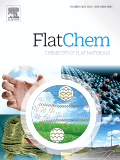
FlatChem
Fostering Global Collaboration in Materials InnovationFlatChem, an esteemed journal published by ELSEVIER, serves as a premier platform for disseminating high-quality research in the dynamic fields of ceramic and composite materials, electronic and optical materials, materials chemistry, and surfaces, coatings, and films. Since its inception in 2017, the journal has garnered a robust reputation, evidenced by its rank in the top quartile (Q1) across multiple categories, including a commendable rank of #25/127 in Ceramics and Composites and #49/284 in Electronic, Optical and Magnetic Materials. With a focus on pioneering advancements and innovative methodologies, FlatChem not only highlights cutting-edge research but also promotes collaboration and knowledge exchange within the scientific community. The journal’s impact is underscored by its impressive rankings in Scopus, marking it as a vital resource for researchers, professionals, and students aiming to stay at the forefront of materials science. As an open-access journal, it ensures that groundbreaking findings are readily accessible, fostering a broader understanding and application of materials innovation worldwide. The journal is based in the Netherlands, with its headquarters located at RADARWEG 29, 1043 NX AMSTERDAM, NETHERLANDS. Join the vibrant community contributing to FlatChem and engage with the forefront of material advancements.

Nano Express
Exploring the cutting-edge of nanomaterials.Nano Express is an esteemed open-access journal published by IOP Publishing Ltd, dedicated to advancing research in the fields of nanotechnology and materials science. Since its launch in 2020, the journal has swiftly established itself as a vital resource for researchers and professionals, garnering significant recognition in various domains, including biomaterials, electronic, optical and magnetic materials, and polymers and plastics. With a commendable categorization in Scopus quartiles, it ranks in Q2 for Electronic, Optical and Magnetic Materials, and maintains a top percentile in several others, exemplifying its commitment to high-quality research dissemination. Located in the United Kingdom, this journal fosters a global dialogue among experts and newcomers alike, facilitating open access to innovative research that drives the future of nanotechnology. By offering a platform for groundbreaking studies and reviews, Nano Express aims to bridge the gap between theoretical understanding and practical application, championing the development of next-generation materials that have the potential to transform various industries.
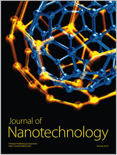
Journal of Nanotechnology
Transforming Materials Science Through Nanotech InsightsThe Journal of Nanotechnology, published by Hindawi Ltd., is a premier open-access platform dedicated to delivering high-quality research in the dynamic field of nanotechnology. With the ISSN 1687-9503 and E-ISSN 1687-9511, this journal has been at the forefront of disseminating innovative findings since its transition to open access in 2009, fostering a global dialogue among researchers, professionals, and students. Based in Egypt, the journal maintains its commitment to advancing the material science sector, currently holding a prestigious Q2 ranking in the 2023 Materials Science (miscellaneous) category, reflecting its significant contribution to the field. With a Scopus ranking of #162 out of 463 journals in General Materials Science, placing it in the 65th percentile, the Journal of Nanotechnology serves as a crucial resource for those looking to explore the latest advancements and applications in nanomaterials. The journal invites submissions that align with its scope, which emphasizes interdisciplinary approaches and novel methodologies, promising to enhance both academic and practical aspects of nanotechnology.

Micro & Nano Letters
Advancing micro and nanoscale innovation.Micro & Nano Letters is a prominent open-access journal published by WILEY, dedicated to advancing the fields of micro and nanoscale science and technology. Since its inception in 2007, the journal has been a valuable resource for researchers, professionals, and students, delivering high-quality research that supports innovation and collaboration in bioengineering, biomedical engineering, condensed matter physics, materials science, and nanoscience. With an impact factor that reflects its growing influence, Micro & Nano Letters has earned recognition in various Scopus categories, including a Q3 ranking in both Condensed Matter Physics and Materials Science as of 2023. Its commitment to open access, established in 2021, ensures that the latest developments in micro- and nanotechnologies are accessible to a global audience, fostering a multidisciplinary dialogue across academia and industry. The journal continues to play a critical role in disseminating cutting-edge research and promoting technological advancements worldwide.

Inorganics
Advancing Inorganic Chemistry for a Global AudienceInorganics is a vibrant, peer-reviewed Open Access journal dedicated to advancing the field of inorganic chemistry, published by MDPI since 2013. Based in Switzerland, this journal aims to provide a dynamic platform for researchers, professionals, and students to share groundbreaking findings, fostering collaboration and innovation within the global scientific community. With an impressive Q2 ranking in the category of Inorganic Chemistry as of 2023, Inorganics stands out as a significant conduit for high-quality research that spans a wide range of topics from coordination compounds to metal-organic frameworks. Its commitment to accessibility ensures that cutting-edge research can be accessed, utilized, and built upon by a diverse audience, thereby amplifying its impact. Join the conversation in Inorganics and contribute to the ever-evolving landscape of inorganic chemical research.

Journal of Nanoanalysis
Unveiling the Potential of Nanomaterials CharacterizationThe Journal of Nanoanalysis is a leading publication in the field of nanotechnology, dedicated to advancing the understanding and application of nanoscale analysis methodologies. Published by BORNA SANJESH KIMIA CO-BSK CO, this journal aims to provide a comprehensive platform for researchers, professionals, and students to disseminate cutting-edge findings and innovative approaches in nanomaterials characterization, nanoelectronics, and related areas. With a focus on high-quality peer-reviewed articles, the journal supports the global scientific community in fostering interdisciplinary collaboration and knowledge sharing. Although currently lacking an explicit impact factor, the Journal of Nanoanalysis is poised to make significant contributions to the field, with its commitment to open access and accessibility globally enriching the pool of research available for academic and practical advancements.

ACS Nanoscience Au
Unlocking Innovations in NanotechnologyACS Nanoscience Au, published by the American Chemical Society, is a leading open-access journal dedicated to the rapidly evolving field of nanoscience. Since its inception in 2021, this journal has established itself within the top quartiles of academic publishing, ranking Q1 in both Chemistry and Materials Science for 2023. With a commitment to disseminating high-quality research, it provides a platform for innovative findings in nanomaterials, nanotechnology applications, and associated interdisciplinary studies. The journal is based in the United States and embraces an open-access model, ensuring that research is freely accessible to a global audience. This initiative not only enhances the visibility of authors' work but also facilitates collaboration across scientific domains. As a vital resource for researchers, professionals, and students alike, ACS Nanoscience Au plays a crucial role in advancing knowledge in the nanoscience community.